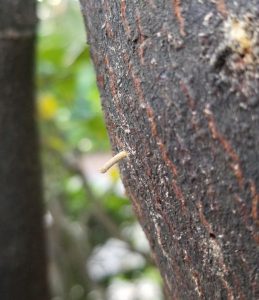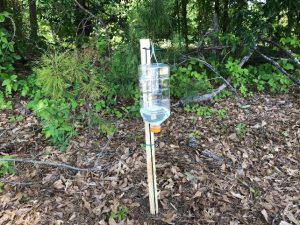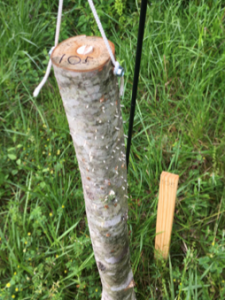Last week I hired a landscaper to trim up a hedgerow of confederate jasmine. I met him at my house while he was doing the work as I wanted to pay him before he left. While there, we began talking about Asian citrus psyllid trapping and granulate ambrosia beetles once known as Asian ambrosia beetles. Before I left I asked him to trim up the ligustrum on the corner by the driveway and we noticed that the nearby volunteer cherry laurel has several brown leaves. I told him that the leaves started turning brown on it a week prior. I was hoping that it would die so that I could cut it down.
Well, no sooner did I return to the office, he sends me a picture of the tree with evidence of granulate ambrosia beetles. This is a serious pest of wood trees and shrubs in Georgia. Their targets may include, but are not limited to dogwood, redbud, maple, ornamental flowering cherry, Japanese maple, crape myrtle, magnolias, azaleas and fruit trees.
The female granulate ambrosia beetle commonly attacks wood shrubs and mature trees under stress from drought, flooding or mechanical wounding. They can sometimes target healthy trees as well. Damage usually occurs below shoulder height of a tree. The symptoms of an active infestation include “toothpicks” or strings of sawdust pushed out of tiny pin holes bored in the bark.

Photo by Jim Houldridge
Control options are limited once granulate ambrosia beetles bore through the bark. The female drills until she reaches the heartwood and there she lays her eggs. All stages of life occur there, making it harder to be exposed to pesticides. Preventive measures to repel invading females or rescue treatments can be applied quickly after the attack. This makes timing crucial. Alcohol-based traps or bolts of wood can be used beginning in February to monitor beetle activity and then make insecticide applications.

Alcohol trap deployed along wood border. Photo: Shimat V. Joseph

Alcohol trap deployed along wood border. Photo: Shimat V. Joseph
Source: Granulate Ambrosia Beetle: Biology and Management Circular 1160